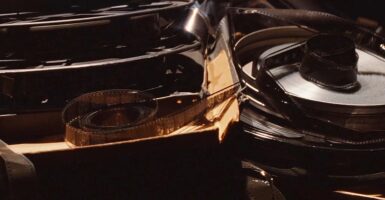Dune Review: Spectacle Overtakes Story
Dune is a sight to behold on the big screen, but is that all there is?
This article is more than 2 years old

In the age of space operas and fantasy epics, it is a challenge to create a film that can be as rich and as in-depth as its source material. Once again, Frank Herbert’s 1965 science fiction novel Dune makes its way back to the big screens in an even bigger way than before, as an A-list cast piques the curiosity of newcomers while re-imagining a classic for the modern era. From director Denis Villeneuve comes a space epic that is crafted to be seen in theaters, even if the direction in which the latest science-fiction blockbuster franchise is headed is cut off a bit too early.
The latest on-screen interpretation is as daunting and as intimidating as the sand dunes that dominate the planet Arrakis, where spice – a powerful hallucinative drug harvested by native race the Fremen – flows. At the heart of this daringly darker first installation of what is expected to be the Dune Cinematic Universe is Paul Atreides (Timothee Chalamet), a brooding, mysterious young prince weighed down with teenage angst. While young Atreides is the soul of the film, it’s hard to empathize with his journey, as he prepares to take on the responsibilities of ruling House Atreides, claiming his heir from his father (Oscar Isaac) while combating his fate of becoming an intergalactic messiah. Each character is defined as an important figure, though there’s no moment of epiphany where audiences can resonate with the space prince and his struggles.
Just as Villeneuve has insisted, Dune is an immaculate spectacle, and the cinematography itself is beyond breathtaking. Medieval imagery fights for attention against the endless, threatening stretches of sand that sweep their way across the otherworldly planet. Vaguely Catholic themes bleed through the cracks of hypnotizing battle scenes with an archaic, barbarically elegant aesthetic. Paul’s trance-like dream sequences with the Fremen are drenched in shades of burnt orange and broken into vision-like fractures. Dune takes its time to revel in each moment and indulges itself to its fullest. There’s no rush for Dune to hurry its beauty. The sandworms that wriggle beneath the wind-sculpted desert are fantastic beasts, both terrifying and truly glorious at once. While they’re closely associated with the Dune series, these magnificent creatures make timely appearances and are more of an unseen threat than all else.

Science fiction has always had the means of being a political vehicle used to draw attention to sociopolitical and economic topics that are reflected in the world outside of fiction. Dune directly grapples with economic politics as well as interplanetary conflicts that have been explored in similar pieces of media such as Star Trek or Star Wars, which has heavily inspired the film’s visual landscape. Ideas of resource scarcity, inequality, war, climate crisis, and self-identity are thrown about and are left open for interpretation, though the distinction of narrative devices clamors on top of one other. Amid their jumbling, they still remain to be important, even if a bit disjointed.
Dune chooses the aspect of “showing” over “telling.” The film relies heavily on visual narrative and the means of action to propel the narrative forward, while in the company of Hans Zimmer’s somber score. The use of telling the story at hand through physical direction and on-screen blocking invites, if not welcomes, personal interpretation of the plot. Much like Ryan Gosling in Blade Runner 2049, Chalamet doesn’t have much to say, and his expressions betray what’s running through his mind without him having to say a word. These wordless interactions are cut a bit too short, and Dune staggers to an abrupt halt. The more the final scene lingers, the less complete it feels, and the movie chooses an awkward point to leave itself hanging off of. A prequel series has been ordered by HBO Max, and while Villeneuve has been angling hard for a part two, the unfulfilled ending is a tricky spot to draw back to.
The film is nearly humorless, bleak, laden in doom, and though it cuts itself down where it stands, finds its strength in its exceptionally stunning cinematics. Dune‘s grandiose, galactic Game of Thrones approach provides a solid groundwork for the franchise to attempt to rebuild itself on, and hosts brilliant ideas through an understuffed story.













